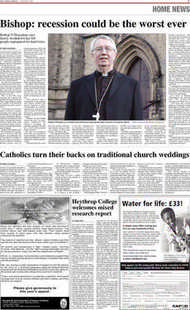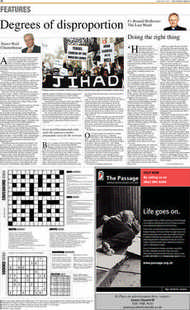Page 14, 9th January 2009
Page 14

Report an error
Noticed an error on this page?If you've noticed an error in this article please click here to report it.
Tags
Share
Related articles
In Sufferable Bohemians
Plays That Leave Accountants In Distress
A Perfect Diva In Drag
Laughter As Old As The Seven Hills Of Rome
'angry Young Man' Does Not Shock Us Any More
Smaller is better. But it’s a shadow of the movie
THEATRE REVIEW
Sunset Boulevard
COMEDY THEATRE
The Watermill Theatre in Newbury, Berkshire, has become well-known to musical aficionados through the transfer of its shows to London. What makes its small-scale productions different is that the cast is expected to act, sing and play musical instruments all at the same time.
Its latest success is the Andrew Lloyd Webber musical which is based on the legendary 1950 Billy Wilder movie. The story, you will remember, is about a screen idol, of the silent film era, living all alone with her butler, and fantasising about making a comeback as Salome. A hack screenwriter, hounded by creditors, fleeing by car, takes refuge in her driveway. He is invited into her crumbling gothic mansion and becomes her scriptwriter and lover.
The film’s special frisson came from the casting of 50year-old Gloria Swanson, the most successful and highestpaid actress of the silent screen. She, too, was making a comeback. The butler – and this was another masterstroke – was played by Erich von Stroheim, who had directed her in Queen Kelly in 1928. Don Black and Christopher Hampton’s book and lyrics stick pretty closely to the original; but, inevitably, without that frisson, the musical is but a shadow of the movie. The role of Norma Desmond is forever identified with Swanson, who gave one of the great cinematic performances of all time. “I’m still big,” says Desmond. “It’s the pictures that got small.” Swanson could have been talking about herself and it is a shock to learn she was not first choice. Mary Pickford and Pola Negri were considered. Mae West turned it down, not wishing to play a has-been.
Trevor Nunn’s West End production in 1993 had a wonderful gilded, sweeping staircase, which was great for Desmond’s final exit, when, mad as a hatter, she descends, thinking the cameras are filming her as Salome.
The musical is much more sentimental than the movie ever was. Nevertheless, it works so well as a chamber piece that it seems better now than it did. Kathryn Evans’s singing has real power; but it is Ben Goddard, as the washed-up young scriptwriter, who takes centre stage. What the understated sexual nature of their relationship really needs is not Andrew Lloyd Webber’s lush romanticism but the cynical world-weariness Rodgers and Hart brought to Pal Joey. Actually, Sunset Boulevard should have been made into an opera.
August: Osage County
NATIONAL THEATRE
Tracy Letts’s saga, a classic American dysfunctional family drama, is coming to the end of its highly successful run and not to be missed by anybody who likes a big emotional play with a large cast and lasting three hours. Plays have been getting smaller and smaller and it’s a rare thing these days to see something quite so timeconsuming on the London stage. The action takes place in a rambling three-storey house, which is situated in the Oklahoma plains. The suicide of the head of the family brings his middle-aged children home, which allows Letts to provide all those sensational and melodramatic ingredients popular audiences have enjoyed from time immemorial: marriages on the rocks, adultery, drugs, alcoholism, seduction of minors and even the possibility of incest.
The play is produced by the Steppenwolf Company in Chicago, one of the major theatrical companies in the world, well-known for the excellence of its ensemble work. The actors have been excellently directed by Anna D Shapiro, who moves from tragedy to comedy and back again, and sometimes simultaneously, with the sort of facility you find in the best productions of Chekhov.
The post-funeral lunch is one of the high spots and is as hilarious as the family luncheon is in Alan Ayckbourn’s The Norman Conquests. The new senior member of the family gives an exemplary demonstration of how not to say grace. The matriarch (splendid Deanna Dungan) sits at the head of the table, a rasping, foul-mouthed monster, dying of cancer. The scene, begun in comedy, ends in farcical horror.
Robert Tanitch
blog comments powered by Disqus





















